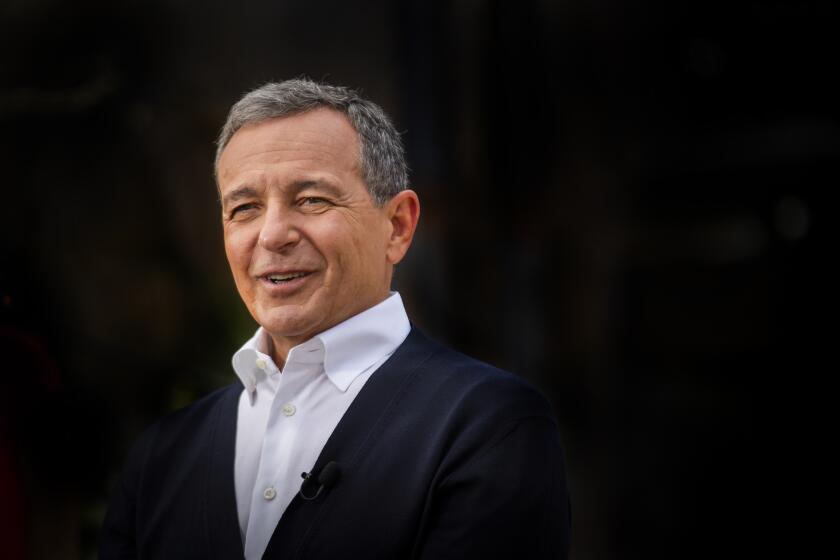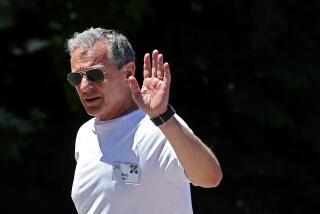Disney, faced with proxy fight, names former Nike CEO Mark Parker as board chairman

Walt Disney Co.’s board of directors has elected former Nike Chief Executive Mark Parker to be its next chairman, the company said Wednesday. The move comes as the company faces a proxy fight with an influential activist shareholder.
The change will take effect after the company’s annual shareholder meeting. Parker, a Disney board director since 2016 and current executive chairman of Nike, will succeed Susan Arnold, a veteran business leader who is not standing for reelection due to Disney’s 15-year term limit for board members.
The date of the shareholder meeting has not been announced.
Parker’s selection for the chairman position is the latest major leadership change for Disney, which in November brought back Bob Iger as chief executive to replace the ousted Bob Chapek. Before the Chapek era, Iger had served as the Burbank entertainment giant’s CEO for 15 years.
The Golden Globes return to NBC after a chaotic journey to recovery from a 2021 Times investigation.
With Arnold’s exit, the size of the board will be reduced to 11 members.
“Mark Parker’s vision, incredible depth of experience and wise counsel have been invaluable to Disney, and I look forward to continuing working with him in his new role, along with our other directors, as we chart the future course for this amazing company,” Iger said in a statement.
The makeup of Disney’s board is key because the body will determine the selection of Iger’s eventual successor. Iger’s new contract as CEO is set to expire after two years.
Parker will chair a newly created succession planning committee within the board, which will advise on planning for Iger’s replacement, “including review of internal and external candidates,” the company said.
“I am honored to have the opportunity to serve as Disney’s Chairman, and I look forward to working closely with Bob and his management team on a strategy of growth that balances investment with profitability, while preserving Disney’s core mission of creative excellence, to deliver shareholder value,” Parker said in a statement. “At the same time, it is the top priority of mine and the Board’s to identify and prepare a successful CEO successor, and that process has already begun.”
Parker served as Nike’s chairman and CEO until 2020.
Bob Iger has ordered Disney employees to return to the office four days a week — Monday through Thursday — starting March 1.
In addition to selecting Parker to lead the board, Disney rejected the overtures of billionaire activist investor Nelson Peltz, whose firm Trian Partners nominated him for election as director at the shareholder meeting in opposition to the nominees recommended by the board and brought forward a proposal to amend Disney’s bylaws.
Trian said Wednesday that it owns 9.4 million shares of Disney’s stock, valued at about $900 million. In a statement, Trian noted the underperformance of Disney’s stock and criticized Disney on a number of fronts, including “failed succession planning” and what it described as a “flawed” direct-to-consumer — or streaming — strategy that struggles with profitability despite high subscriber counts and revenues.
“Disney has an incredible legacy as one of the leading and most successful consumer entertainment companies in the world, having built some of the most celebrated consumer brands and an unparalleled content portfolio that resonates with audiences of all ages across the globe,” Peltz said. “But in recent years, the Company has lost its way resulting in a rapid deterioration in its financial performance from a consistent dividend-paying, high free cash flow generative business into a highly leveraged enterprise with reduced earnings power and weak free cash flow conversion.”
Disney said in a statement that it has engaged with Peltz “numerous times over the last few months,” but does not support his candidacy and instead recommends that investors vote for its picks. While trying to fend off Peltz’s proxy battle, Disney praised Iger’s leadership.
“Mr. Iger’s mandate is to use his two-year term and depth of experience in the industry to adapt the business model for the shifting media landscape, rebalancing investment with revenue opportunity while bringing a renewed focus on the creative talent that has made The Walt Disney Company the envy of the industry,” the company said. “Mr. Iger has already taken decisive steps to realign content creation and distribution, and reposition Disney’s streaming platforms and linear broadcast and cable networks for enhanced profitability for the Company.”
Iger, over the last two months, has already started to make major moves to reshape Disney.
Right away, he assigned a task force to restructure the company and restore power to the company’s creative leaders. On Monday, he ordered employees to return to working in the office four days a week, Monday through Thursday, a relatively rigid return-to-office plan for the media industry.
The company on Tuesday revised policies related to annual passes, hotel parking and ticketing for its parks and resorts, which have been criticized by fans for nickle-and-diming guests.
Disney faces massive challenges in its second Iger age, including growing concerns about the profitability of the streaming business model, on which Disney has bet heavily with Disney+.
More to Read
Inside the business of entertainment
The Wide Shot brings you news, analysis and insights on everything from streaming wars to production — and what it all means for the future.
You may occasionally receive promotional content from the Los Angeles Times.













